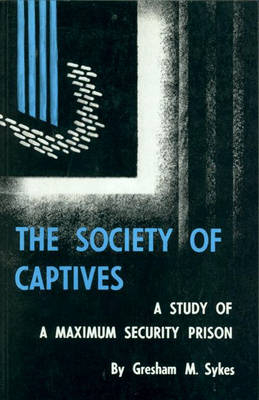
Society of Captives
A Study of a Maximum Security Prison
Seiten
1971
Princeton University Press (Verlag)
978-0-691-02814-9 (ISBN)
Princeton University Press (Verlag)
978-0-691-02814-9 (ISBN)
- Titel ist leider vergriffen;
keine Neuauflage - Artikel merken
Argues that many of the psychological effects of modern prison are more brutal than the physical cruelties of the past. This book shows that the stronger the bonds among prisoners, the more difficult it was for prison guards to run the prisons without finding ways of "accommodating" the prisoners.
Gresham Sykes wrote the book at the height of the Cold War, motivated by the world's experience of fascism and communism to study the closest thing to a totalitarian system in American life: a maximum security prison. The book is remarkably short - just 150 pages - but bristles with ideas. Sykes argued that many of the psychological effects of modern prison are even more brutal than the physical cruelties of the past. The trauma of being designated one of the very worst human beings in the world left prisoners with lifelong scars. It also inspired solidarity among prisoners and fierce resistance to authorities as strategies for rejecting those who rejected them. His analysis called into question whether prisons genuinely were, as many believed, "total institutions," where every facet of life was rigidly controlled. Sykes showed that the stronger the bonds among prisoners, the more difficult it was for prison guards to run the prisons without finding ways of "accommodating" the prisoners. The book set the stage for Michel Foucault's Discipline and Punish, among other works.
Since it appeared in 1958, it has served society as an indispensable text in coming to terms with the nature of modern power.
Gresham Sykes wrote the book at the height of the Cold War, motivated by the world's experience of fascism and communism to study the closest thing to a totalitarian system in American life: a maximum security prison. The book is remarkably short - just 150 pages - but bristles with ideas. Sykes argued that many of the psychological effects of modern prison are even more brutal than the physical cruelties of the past. The trauma of being designated one of the very worst human beings in the world left prisoners with lifelong scars. It also inspired solidarity among prisoners and fierce resistance to authorities as strategies for rejecting those who rejected them. His analysis called into question whether prisons genuinely were, as many believed, "total institutions," where every facet of life was rigidly controlled. Sykes showed that the stronger the bonds among prisoners, the more difficult it was for prison guards to run the prisons without finding ways of "accommodating" the prisoners. The book set the stage for Michel Foucault's Discipline and Punish, among other works.
Since it appeared in 1958, it has served society as an indispensable text in coming to terms with the nature of modern power.
| Erscheint lt. Verlag | 21.2.1971 |
|---|---|
| Verlagsort | New Jersey |
| Sprache | englisch |
| Themenwelt | Geschichte ► Teilgebiete der Geschichte ► Kulturgeschichte |
| Geschichte ► Teilgebiete der Geschichte ► Sozialgeschichte | |
| Recht / Steuern ► Strafrecht ► Kriminologie | |
| ISBN-10 | 0-691-02814-1 / 0691028141 |
| ISBN-13 | 978-0-691-02814-9 / 9780691028149 |
| Zustand | Neuware |
| Haben Sie eine Frage zum Produkt? |
Mehr entdecken
aus dem Bereich
aus dem Bereich
der stille Abschied vom bäuerlichen Leben in Deutschland
Buch | Hardcover (2023)
C.H.Beck (Verlag)
23,00 €
vom Mittelalter bis zur Gegenwart
Buch | Softcover (2024)
C.H.Beck (Verlag)
12,00 €


